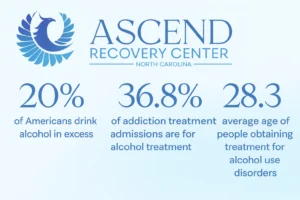Maybe it’s been on your mind for a while—cutting back, quitting, or at least figuring out what alcohol means in your life now. Not because something catastrophic happened, but because something’s starting to shift.
You don’t feel out of control. You’re not calling yourself an addict. But you’re wondering:
- “Is this helping me or hurting me?”
- “Would I feel better if I didn’t drink?”
- “Am I drinking more than I want to admit?”
If you’re asking those questions, you’re not broken. You’re awake. And there’s space for you to explore what healing can look like—without waiting for rock bottom.
This blog will walk you through how to explore alcohol addiction treatment in Charlotte, North Carolina without judgment, pressure, or labels you’re not ready to wear.
1. Ditch the “All or Nothing” Thinking
One of the biggest roadblocks for the sober curious is the belief that treatment is only for people with full-blown addiction.
Here’s the truth:
Treatment isn’t just for people whose lives are falling apart. It’s also for people who are holding it all together—but quietly wondering if they could feel better.
There’s a wide range of reasons someone might explore treatment, including:
- Trouble sleeping after drinking
- Brain fog or anxiety that seems alcohol-related
- Losing interest in things that used to bring joy
- Drinking more often than intended
- Feeling emotionally flat, disconnected, or numb
You don’t need a “problem” to want more peace. And you don’t need to be sure to start exploring.
2. Start with Safe, Pressure-Free Information
If you’re nervous about talking to someone, start by reading. There are great resources that explain:
- What treatment can look like
- What kinds of programs exist
- What recovery means (and doesn’t mean)
Check out local pages like Ascend’s Alcohol Addiction Treatment page for language that feels inviting, not intense.
Here’s what to look for in any provider page:
- Does it talk about options, not just 30-day programs?
- Does it mention therapy or peer support—not just detox?
- Does it speak to you, or only to people in crisis?
If you don’t feel seen in the first few sentences, keep looking.
3. Choose a Place That Feels Like a Partner, Not a Judge
Not all treatment centers are the same. The best ones know how to meet you where you are—even if you’re still unsure.
Look for signs of a judgment-free, modern approach:
- They talk about individualized care, not cookie-cutter programs
- They offer outpatient options (like IOP) that let you keep living your life
- They validate that not everyone who drinks heavily has the same goals
Ascend Recovery Center in Charlotte is one such place. They offer flexible programs designed for people who are questioning their alcohol use—not just those in crisis.

4. Try Naming What’s Working—and What’s Not
This part is uncomfortable, but powerful. Ask yourself:
- Is alcohol still helping me relax—or is it adding to my anxiety?
- Do I feel more connected or more isolated when I drink?
- Am I using alcohol to avoid something I don’t want to feel?
There’s no need to force an identity or diagnosis. Just notice.
Sometimes, it helps to journal or talk to a neutral person—like a therapist or coach. You don’t need to say, “I have a drinking problem.” You can just say, “I’m thinking about my relationship with alcohol and I want some support sorting that out.”
That’s valid. That’s enough.
5. Explore Outpatient Treatment as a Low-Commitment Start
When people hear “treatment,” they often imagine leaving work, checking into a facility, and making a big announcement. But outpatient care is different.
At Ascend in Charlotte, outpatient options let you:
- Stay at home while attending therapy
- Join small group sessions that meet in the evenings
- Keep your job, your routines, and your privacy
- Go at your own pace
These programs are built for real life. You can even join as someone who isn’t sure what their end goal is. You’re allowed to be curious—not convinced.
6. Don’t Wait Until It Feels “Bad Enough”
This might be the most important thing:
You don’t need to earn your way into treatment through suffering.
If alcohol is dulling your spark—even a little—that’s reason enough to ask what life might feel like with less of it. Some of the strongest recoveries begin not in emergency rooms, but in quiet moments of honesty.
If you’re wondering whether this path is for you… it probably is.
FAQ: Alcohol Treatment Questions (Especially for the Sober Curious)
Do I have to call myself an alcoholic to get help?
No. Many people who seek help never use that word. At Ascend, we meet you where you are—whether you want to stop completely, cut back, or just understand what’s going on.
What if I’m not sure I want to quit drinking?
That’s okay. Curiosity is a great place to start. You don’t have to commit to quitting forever in order to talk to someone or explore outpatient treatment.
Is alcohol addiction treatment only for people in crisis?
Not at all. Many people who look into treatment still have jobs, relationships, and routines that work. They’re just feeling stuck, tired, or disconnected—and wondering if alcohol plays a part in that.
What’s outpatient alcohol treatment like?
Outpatient programs (like those at Ascend in Charlotte) are flexible, non-residential options that include therapy, group support, and education. You can keep working and living at home while getting support.
Will I be pressured to make a big change right away?
No. A judgment-free provider will help you figure out what you want—not push a one-size-fits-all plan. At Ascend, your goals shape your path.
How do I know if Ascend is right for me?
If you’re looking for alcohol treatment in Charlotte that’s flexible, respectful, and doesn’t require a crisis to begin, Ascend is a strong fit. You can learn more or reach out for a no-pressure conversation anytime.
You’re Allowed to Ask for More—Without Apologizing
You don’t have to crash and burn before you reach out.
You don’t need to be “ready for sobriety.”
You just need to be ready to ask whether alcohol is helping—or hurting—your life.
That question alone is powerful. It means you care. It means you’re paying attention. And it means you deserve support, wherever this leads.
📞 Ready to explore your options—without pressure or shame?
Call (844) 628-9997 or visit Ascend’s Alcohol Addiction Treatment page in Charlotte, NC. You don’t have to be sure. You just have to be curious.


